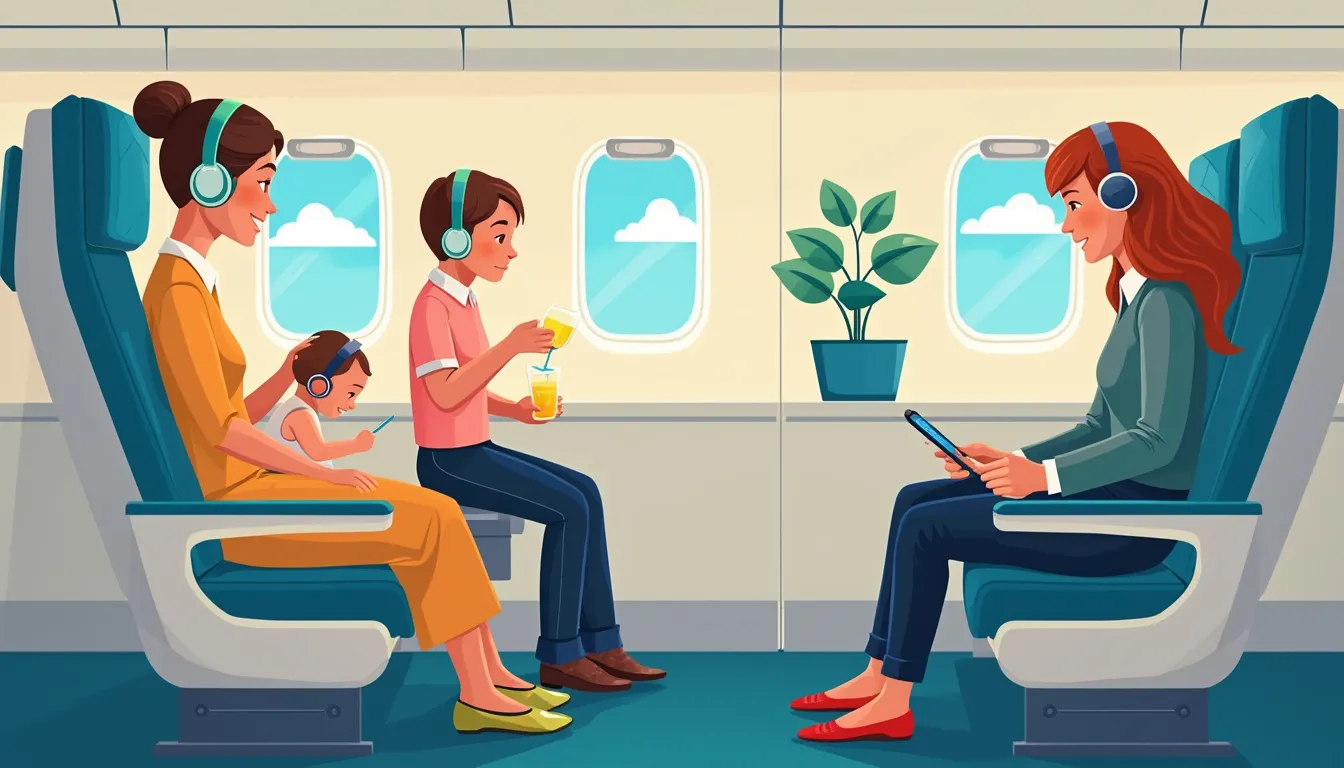Navigating the intricacies of air travel can be daunting for any parent, especially when it involves an infant. Understanding when an infant can travel by plane is crucial for ensuring a safe and smooth journey for both the baby and the parents. The age and health of your infant are significant factors to consider before embarking on air travel, as is adhering to specific airline policies and obtaining the necessary documentation. These essential guidelines are designed to help parents make informed decisions, ensuring a stress-free flying experience.
Whether you’re planning a trip to visit family or embarking on a vacation, knowing when an infant can travel by plane involves more than just booking a ticket. Factors such as medical advice, airline regulations, and vital paperwork play pivotal roles in your travel plans. By following expert recommendations and understanding the critical aspects of flying with an infant, you can make the experience pleasant and comfortable.
Parents must also be well-prepared for the journey itself. This includes packing all the necessary items to keep your infant comfortable, such as feeding supplies, sleeping aids, and items to help with ear pressure changes during takeoff and landing. Additionally, understanding how to best care for your infant post-flight can help minimize any adverse effects of air travel, ensuring their well-being continues long after the plane has landed.
Gaining insights into when an infant can travel by plane and learning the essential guidelines for parents will not only alleviate travel anxiety but will also set the stage for enjoyable and memorable trips with your little one.
When Can an Infant Travel by Plane: Essential Guidelines for Parents
Introduction: Understanding When an Infant Can Travel by Plane
As a new parent, it’s natural to have concerns about taking your infant on a flight. The question of when can an infant travel by plane is one that many parents grapple with. Knowing the best time to travel with your infant can make the experience significantly less stressful for both you and your baby.
Understanding the nuances of when an infant can travel by plane is essential for several reasons. Firstly, airlines have specific policies and regulations concerning infant passengers, and these rules can vary greatly between different carriers. Being aware of these policies helps ensure a smoother boarding process and overall travel experience.
Secondly, the health and safety of your infant is paramount. Consulting with healthcare professionals to determine whether your baby is fit for air travel is crucial. Infants have unique medical needs, and their bodies react differently to the conditions of air travel compared to older children and adults.
Thirdly, the paperwork involved in air travel with an infant can be surprisingly detailed. Parents need to be aware of the necessary documentation required to fly with an infant, which may include birth certificates, passports, and in some cases, letters of authorization.
This segment aims to provide an overview of the essential guidelines parents need to consider before deciding when can an infant travel by plane. This includes the importance of adhering to health and age requirements, understanding airline policies, and ensuring all necessary documentation is in place.
Let’s delve deeper into these essential guidelines to equip you with the knowledge and confidence you need for air travel with your infant.

Deciding when an infant can travel by plane involves various important factors that parents need to consider to ensure their baby’s safety and comfort. From health and age requirements to understanding airline policies and necessary documentation, every element plays a critical role in the decision-making process. Here’s what you need to know before booking that flight:
Health and Age Requirements: Medical Advice on Infant Air Travel
When determining when can an infant travel by plane, the health and age of the baby are crucial elements to consider. Most pediatricians recommend waiting until an infant is at least 2 to 3 months old before flying. This recommendation is based on the baby’s developing immune system, as infants are more susceptible to infections in the early weeks of life. Moreover, the confined space and recirculated air in airplanes increase the risk of transmitting illnesses.
It’s always best to consult your pediatrician before traveling. They can provide personalized advice based on your infant’s health and medical history. Babies born prematurely, with respiratory issues, or other health conditions, might require more stringent precautions. A doctor can also give guidelines on how to handle typical travel-related stressors such as air pressure changes, which can affect an infant’s delicate ears.
Airline Policies and Regulations on Infant Passengers
Before booking a flight, it’s essential to review the specific airline policies and regulations on infant passengers. Different airlines have varying rules about the minimum age for infants to fly. Generally, many airlines allow infants as young as 2 days old to travel, but some might have more restrictive policies. Here are some common considerations:
- Age Restrictions: Check if the airline has a minimum age requirement. While some airlines may permit newborns, they often have conditions such as requiring a medical certificate.
- Seating Options: Infants under the age of 2 can often travel as a lap infant, meaning they do not require their own seat and can sit on a parent’s lap during the flight. However, purchasing a separate seat and using an approved car seat might offer more comfort and safety.
- Bassinet Availability: For long-haul flights, inquire about in-flight bassinets. Many airlines offer these on a first-come, first-served basis for infants under a certain weight and age, providing a secure and restful option for your baby.
- Fees and Charges: Check if there are any additional fees for traveling with an infant. While some airlines allow infants to travel for free or at a reduced fare if seated on a parent’s lap, others might have specific charges for infant passengers.
Necessary Documentation for Infant Travel
Traveling with an infant requires certain documentation to ensure a smooth journey. Here’s a checklist of necessary documentation for infant travel:
- Birth Certificate: Carry a copy of your baby’s birth certificate. Many airlines require proof of age for infants and toddlers to ensure they meet the travel requirements.
- Passport and Visa: For international travel, your infant will need a valid passport and, if necessary, a visa. Ensure you apply for these well in advance, as processing times can vary.
- Medical Certificate: Some airlines might require a medical certificate for newborns, especially those younger than 7 days old. The certificate should state that the baby is fit to fly.
- Parental Consent Forms: If one parent is traveling alone with the infant, a notarized consent letter from the other parent might be required. This is particularly important for international travel to prevent child abduction issues.
Taking the time to address these critical factors before planning your trip can help ensure a more comfortable and stress-free experience for both you and your infant. Knowing when can an infant travel by plane involves thorough understanding of health recommendations, airline regulations, and requisite documentation, ensuring your little one’s first flight is safe and enjoyable.
Tips and Precautions for Flying with an Infant
Preparing for the Flight: Packing Essentials and Comfort Items
Ensuring a smooth journey starts with thorough preparation. When considering when can an infant travel by plane, one of the first steps is to pack strategically. Here’s a list of essential items to include in your carry-on:
- Diapers and Wipes: Bring enough for the duration of the flight and any potential delays.
- Change of Clothes: Pack at least two extra sets of clothing for your infant to handle spills and accidents.
- Feeding Supplies: If you’re bottle-feeding, carry enough formula or pumped milk. For breastfeeding mothers, consider a nursing cover for privacy.
- Comfort Items: Familiar items like a favorite blanket or toy can help soothe your baby.
- Medications: Any essential medications should be kept in your carry-on for easy access.
- Pacifier: Useful for helping your baby manage ear pressure changes during takeoff and landing.
During the Flight: Managing Feeding, Sleeping, and Ear Pressure
Once you are on board, there are several strategies to ensure your baby’s comfort. The question of when can an infant travel by plane also pertains to how well you can manage their needs in the air:
- Feeding: Often, feeding your baby during takeoff and landing can help alleviate ear pressure. Whether you’re breastfeeding or bottle-feeding, the swallowing action assists in equalizing ear pressure.
- Sleeping: Aim to stick to your infant’s sleep schedule as closely as possible. Consider using a travel bassinet or baby carrier to keep your baby comfortable and secure. And don’t forget to bring a familiar blanket or sleeping aid.
- Ear Pressure: In addition to feeding, using a pacifier can also help mitigate the discomfort associated with ear pressure changes. For older infants, sippy cups or teething toys might provide relief.
- Noise Management: Airplane cabins can be noisy, which might disturb your baby. Consider using baby earplugs or noise-canceling headphones designed for infants to minimize discomfort.
- Movement: Take advantage of any opportunities to move around the cabin when the seatbelt sign is off. Gentle rocking and pacing can help soothe a fussy baby.
Post-Flight Care: Ensuring Infant Well-being After Traveling by Plane
After safely landing, it’s crucial to monitor your baby’s health and comfort. The journey doesn’t end when the plane lands, and understanding when can an infant travel by plane includes knowing how to care for them post-flight:
- Hydration: Flying can be dehydrating, so ensure your infant stays well-hydrated by feeding them frequently.
- Rest: Your baby may be tired or overstimulated after the journey. Create a calm environment to help them rest and recover.
- Monitor Health: Look out for any signs of illness or discomfort in the days following the flight. If you notice anything unusual, consult a healthcare provider promptly.
- Re-establish Routine: Try to get back to your baby’s regular feeding and sleeping schedule as soon as possible to provide them with a sense of normalcy.
By following these tips and precautions, you can help ensure a smoother and more comfortable travel experience for both you and your infant. Proper planning and attentiveness to your baby’s needs are key to successful air travel with a young child.
In conclusion, determining when an infant can travel by plane involves careful consideration of several crucial factors. Primarily, it is essential to be informed about the health and age requirements, seeking medical advice to ensure that the infant is fit for air travel. Airline policies and regulations also play a significant role, as they vary and dictate specific rules regarding infant passengers. Additionally, having all necessary documentation ready can prevent any last-minute hassles at the airport.
Parents should take proactive steps to prepare for the flight, including packing all essential items to keep the infant comfortable and happy. During the flight, attention to feeding schedules, sleeping patterns, and managing ear pressure can significantly enhance the travel experience for both the infant and the parents. Once the journey is complete, post-flight care is crucial to ensure the infant’s well-being, as changes in environment and routine can impact their health and comfort.
By adhering to these guidelines, parents can make informed decisions regarding when their infant can travel by plane, ensuring a safe and pleasant journey for their little one.







